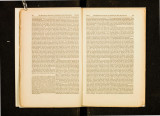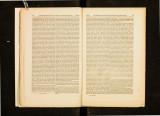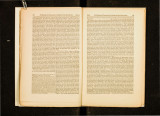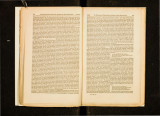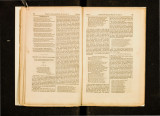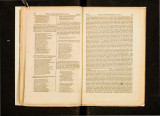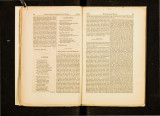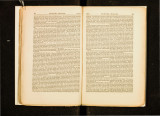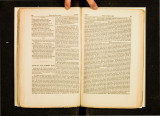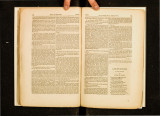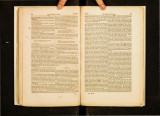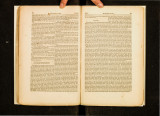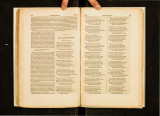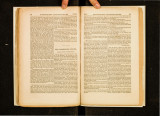| OCR Text |
Show 4G2 The Massachusetts Proposition for Abolishing l11e Slave Representation. [AUGUST, Adams cou]J thus acl, will appear by referring to I good thin,!! any man dueth, the same shall he re. the opinions which he publishell under his name in ceive of the Lord, whether he be bond o~ free." the National Jnt ellige~lC~r six years ago. He. then A le.~rned commentato~, (Dr. Scou:! adnu:s tha~ said. "lam not commz.sstoncd to denounce theJudg- the servant~ at that lime were sla cs, the prop ment of God upon those who differ from me in re- erty of their masters." Archdeacon Pal~y , an opligious belit>f, whether npon the slavery question, or ponent of slavery, hut a learne.d _thco!ogt.an,. said : upon any other. 11 At what period si n('.e, and hy "Slavery was a part of the ctvll consttlutwn of whom was he "Clllnmissioned to Jenuunce judg· most count riPs when Christ ianity appearc{l; yet no ment" against the slave-holders! passage is found in the Scriptures by wlu'clt it The Southern people claim, and will exercise is c011demn.ed or prol1ibiled." the right to interpret the Dible for themselves, and Bancroft, of 1\fassachuse tts, the historian of our they do not believe that sla\·ery is prohibited by the own times, has remarked, that "slavery and the Christian religion. "Both thy bondmen and bond· slave-trade :~re older than the records of human maids, which thou shalt have-, shall be of the hea· society." Slavery existed in Assyria and Babylon. then that are among ) 'UU. Of them shall ye buy The Pyramids of Egypt were reared by slave lahor. hondmen and bondmaids. Moreover, of the chi I- Ancient Carthage had slaves; and so had the 11edren of the strangers that do sojourn among- yon, puhlics of Greece atHI Rome. The Grecian Re· of them shall ye bny, and of their families thai are publics had more sJa,•es than freemen; and when with you, which tltey be~ot in your land, and they the population of the Roman Empire was computed shall he yvur possession. And ye shall take them at 120 million s, one half of that number consisted as an inlteritance for your children after you to of sla\·es. Negro slaves were known in Home anti inhen't them by possession. They shall be your Greece. The philosopher, Ari stotle, one of tlte bondmen for ever."-(Leviticus, ch<1pter XXV.) \visest of the ancients, was a. zealnus advocate of Such were the words which "the Lord sp:~ke unto sla \·ery. The inflexible Roman patriot, Cato, was Moses in Mount Sinai." The passage e\·inces a a large slave-holder. In those ages whidt sueconfirmation of rights, similar in many respects to ceeded the downfall of the Homan Empire in the those appertaining to the inhabitants of the Sou th - \Vest, slaves constituted the most numerous class ern States. The sla\·es were originally "of the of society.• H allam remarks. that" in every age heathen,'' the ir posterity was'' begot in uur land," and country, until times comparativ ely recent, perami they have descended "as an inheritance." sonal sen·itude appears to have been the lot of a \Vhen Christ appea1ed on earth, slavery was very large, perhaps the greater ponion of mankind."' prevalent, and although he, on many oceasions, The people of Europe had engaged in the tr:tffic of warned mankind against sin and reproved sinners, negro slaves some time before the discO\'ery of we nowhere find him denouncing slavery as sinfuL America. :Even in this day of civilization, slavery He saw it, left it to continne, and suffered it to is by no means confined to this continent. The spread over :1 new world. The Author of our re· serfs of Russia are s\a.ves, and Great Britain has Jig inn came to suffer and to die, and in dissemina· million3 of slaves under her control in the EastInting his doctrines, he dreaded no human censure or dies. A few years ago in a debate in the House It~~ man pu11ishment. The base motive of fear can- of Commons, it was explicilly acknowledged, that not be ascribed to a Being so exalted and so trans- "slavery prevails to a great extent in Beng:d." In cendently pure. Had he reg:trded slavery as siu ful , Africa,slal'ery has prevailed so long, that" the mcmit is hut reasonable to infer, that he would ha\'e ory of man runneth not to the contrary.'' Park prohibited it in language tau emphatic, too clear, too estimates that "the slaves of Africa are nearly in precise to allow cavil or justify disputation. Is it the proportion of three to one of freemen; and not the height of arrogan<'e and presumplion fur hired servants as altogether unl;,nown." The habits, mortals to meddle rashly and officiously with a sub- manners, social relations and S)'Stems uf gover n~ ject from which the Saviour carefully abstained! ment in Afric:~, are those which characteri~e ba~· \Ve are told that slavery is :~t war with the spirit barians. Those brought hither were capll \'es 111 of Christianity. lf so, then the aholitionists must war, and had no civ il rights at home. They ac· believe that the Apostle Paul, who was one of the qui red none here; they came as bondsmen: their most eloquent and efiicientadvocatesofChriSiianity posterity were ''begot in our land," and ha\'0 bethat ever li\·ecl, was more i<Jnorant of its spirit than come" our possession." Their remnval from Africa themselves. In one of his"' epistles to the Bphesi- to the United States. and their associatinn with ans, he savs: "Servants be obedient to them that another a.nd more c:ultivated race, have contributed are your ~nasters according to the flesh, with fear greatly to their civilization, comfort and happiness. and trembling, in singleness of heart as to Christ. They left a continent en \·eloped in ignorance and Not with eye-sen·ice as men-pleasers, but as ser· superstition, and dis!!raceJ by unjustifiable wars, to nnts of Christ, doing the will of God from the I inhabit another, wlu:re law ~nd order, plent~ a_nd heart. With good will doing ser vice as to the peace have generally prevailed. The raptd Ill· Lord and not as to men; knowing that whatsoever • See Rolrerlson. 1845.] The Massachusetts Proposition for Abolishing the Slave Representation. 463 crease of their number in the 1Jniterl States, is a hy this standard, and what is his condition 1 Exconclusive proof of the care and humanity with treme poverty compels him to almost incessant toil, which thev have been treated.-. Public opinion in and uneducated as he is, he knows and feels that the Sla ve-hnlJing Statf's is decidely hostile to every he has no security against an excess of labor, against thing like eruelty towal'(ls the slave populalion. ignorance, destitution and wretchedness. Utterly Their laws recognize slaves as persons entitled to dev11id of that sense of conscious security which protection, and while occupying a station in society gi\·es value to political lillerty, his happiness would bP]<Hv that of freemen, they are considered at the lie promoted by exchanging situati11 ns with the Snnth in a light altogether different frurn that in American slave. The imagination of the latter is which the abolitionists ha\·c with such pe r~evering not tlallercd by the idea, that he is a freeman, but f<JI.sehooJ represented them. That the slaves are he breathes on the soil of the planting States an well fed, well clothed, and not required to perform an atmosphere more pnre than that of a Growded fac ~ unreasonaUle :~mo11nt of laUor is well known, and lory, he is less exposed to the contag"ion of vice, is the fact was cheerfully acknowledged lly the IJritish required to labor less, receives a larger supply of trave11er 1\'iurmy, then a decided foe to the institu· nutritious fuod, and is exempt from all apprehention of slavery.t \Ve have the authority of a dis- siun of want during sickness, or of starvation, in tinguishcd member of the House of Commons for the eveni ng of life. If a sense of secu ri ty be taken tl1e statement, (ba sed upon oflicial returns,) that as the criterion of political liberty, the negro of the the inriPpendent agricuhural labnrer of England is Southern States is more of a freeman than tl,e allowed only three ounces of meat per week. This Engli sh operative. is below the daily average allowance of meat to the W11h the operati\·es of Great Britain, the people slave laborers of the Southern States. The same of our country have no right, nor ha\'e they asgentlemen has referred to <tuthentic documents dis· sertcd any right to interfere, although the English closing instances of children in the factories whn abolitionists have indicated an impertinent wish to were re4ui red to work " 17 hours a day all the regulate the domestic concerns of the Slave-holding year round. ''t Nothing like this amount of labor States. The condition of the English operati\·es has ever been, or is now required of the slaves of h:~s been referred to, as i11ustrating the fact, that this country. If the reports laid before Parliament political liberty does not imply individual comfort, by cnmmissioners appoiuted by that body are to be or necessarily secure individual happiness. This believed, there are hundreds of thousands of opera- tru th needs no argument or illustration to con~ ti\·es in the English factories subjected to a scrvi- vince the understanding- of any considerate and tndc far more appalling than any which has ever sober man, and is overlooked hy none except the existed on this continent. F.xcessive labor and abolitionists of Great Brit:~in and the United States. cruel discipline, a heated and impure air, insuffi- It may be said, that admiuing the slaves of this cient and unpalatable food, vice and profligacy in coumry to be in a better situation than that of the their most degrading forms are the dismal charac- English operati\·es, i~ by no means follows that the teristica of English f<tctory life.~ The operatives condition of the slaves here is not susceptible of ha\'e not found liberty and happiness to he synony- amelioration. This is tme, and the question arises, mous; they have discovered no magic power in lib- whose right and whose duty is it to provide fur erty, I.Jy which men can live without labor. " Po- their comfort and happiness~ The sla\·es do not liticalliberty,·• according to Montesqnieu, u con· belong to the Northern people, nor have the Sla\·esists in security, or in the opinion people have of holding States ever divested themselves of the their security." Let the English operative be judged right to control and regulate their own municipal concerns. The institution of slavery is one ap· pertaining to the States in which it exists; in the language of l\•l r. Webster. it is emphalically" their affair." llea\·en will not hold the descendants uf * While the proportion of in5anc and idiot5 among tl1e free rolorcd people resilling in the free Stales is I in e1·ery 143 persons, the proportion of ins:~ne and idiots among the colored free pop•tlation a11d the slave populil.tion inclusive the pilgrims and puritans responsible for the conis I in every 1,605. duct of the Southern people, who, we trusl, will, "tIt is 11 dcplnraUle fact."_(saiflthe Edinburg Review of in due season, render a good account of their stew· :~!7/{e~ 1~t\.~~~. ~:~~:~h ~;~~~~cr~~~~rl~~-~::~;c: ~:~~:~~·~sit~:~~ a~~ship before the great s~archer of hearts.. The gar.,; than they do as lat1orers." The same v.ork states the C I!J'l.ell~ of the S/a\'e-hnldmg States are entttled to number of Ueggars in En;; land alone at 150,000 per~>ons. whnte,·er advantages sla,·cry may afford, and must t Bnlwer's England and the English. submit to any e\·ils which the s_vstem may entail 9 The chilflren v. ho are employed in the collieries of Eng· upon them, \Vhelher they ought to abolish slavery lanrl, j)rol•aUiy suffer more than the operaTiH'S in tbt> fat'- -<~.t what time and in what mode, are <Jrave questories. Th_e \VesJminster _Review for 1.8 12 states Jhat in tions, which lh~ ., :~ml the only, must d~cide. The the coal m1nes of D~:rloysh1re, where children from D to 8 . . .} . y 1 are engaged. "from 13 to 10 hour~ are <·onsidered a day'~> aboiJtton of s\a~·ery Ill the Northern Slates was an work; from 11 to 12 hours are reckoned three-quarters of a easy task, involving no risk of peace. and but slight day's work; ond ei"glzt hmtrl moke holf a day's work.'' loss of property, as the number of slaves in tho.se |







